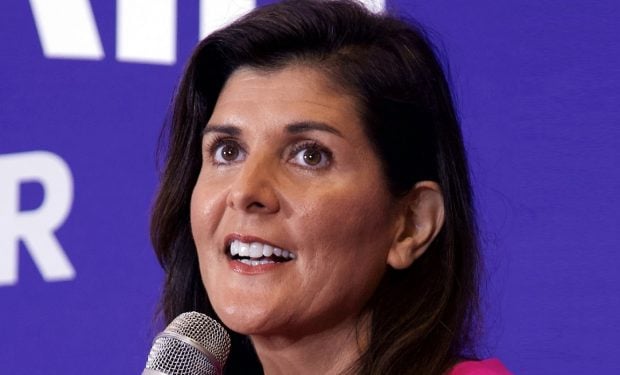Nobel Prize-winning economist and New York Times writer Paul Krugman poses a rhetorical question about what GOP presidential candidate Nikki Haley stands for and then provides this answer: “From a political point of view, one answer might be: nothing.” Krugman cites Haley’s much-reported “flip-flopping” on issues, showing an ability — for better or worse — to tailor her message to the audience and the moment rather than hewing to a set of core principles.
[“No political figure better illustrates the tragic collapse of the modern Republican Party than Nikki Haley,” Republican political consultant Stuart Stevens wrote earlier this year, recalling how in 2016 Haley “eviscerated Mr. Trump as a racist the party must reject: ‘I will not stop until we fight a man that chooses not to disavow the K.K.K. That is not a part of our party. That is not who we want as president.’ She was courageous, fighting on principle, a warrior who would never back down. Until she did.”]
Krugman, calling anyone who still believes Haley could govern as a moderate “delusional,” writes that flip-flopping isn’t a strong enough term for the Equivocations of Nikki, because “‘flip-flopping’ doesn’t really convey the sheer cynicism with which she has shifted her rhetoric and changed her positions on everything from abortion rights to immigration to whether it’s OK to try overturning a national election.”
Haley recently has moved up in polls, with some showing the former South Carolina governor now in a distant second place behind the frontrunning former President Donald Trump. One result of her relative rise has been a spark of interest from wealthy donors and would-be kingmaking Republicans. Even Home Depot co-founder Kenneth Langone has said he would prefer Haley to Trump.
What would a Haley presidency look like, according to Krugman, if “moderate” isn’t in the picture? Fiscal policy is an area where the Nobelist says Haley is more consistent than elsewhere — and not in a good way, according to his view.
No one wants to talk about the fact that Medicare will start running out of money in less than 10 years. But we have the solution to lower costs and improve care.
— Nikki Haley (@NikkiHaley) November 26, 2023
Read how here: https://t.co/dIDxFB8UDM
Part of her consistency on financial matters includes wanting to raise the age at which Social Security can be collected, which Krugman exposes as a policy that disproportionately hurts the poor. (Increased life expectancy, from which the raised age idea stems, is real for wealthy Americans but not for the rest — including those who need social security most.)
Krugman asserts that portraying Medicare and Social Security as programs on the precipice — in dire straits — is disingenuous and overused for political gain. He admits the programs will need additional funding to meet obligations, but insists Haley’s vision is the wrong one. “On fiscal and economic policy,” Krugman writes, “[Haley is] a hard-right advocate of tax cuts for the rich and benefit cuts for the working class.”
There’s a calculus that trickle-down tax-cutters don’t like, but which Krugman insists is purely sensible: Paying for benefits requires revenue. Taxes supply revenue. Cutting benefits is a direct result of cutting taxes. Krugman asserts that Haley’s fearful scenario of an empty benefits pot is manifest only because “America collects less revenue as a percentage of G.D.P. than almost any other advanced economy.”
